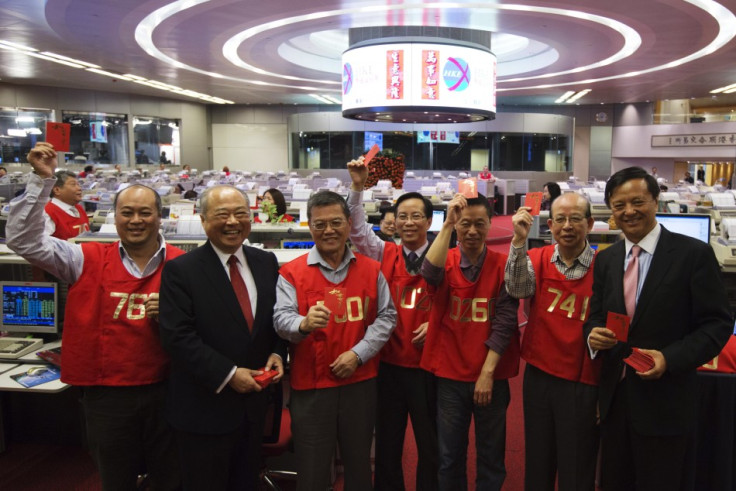Asian Markets Weekly Review: Hang Seng Outshines Other Indices

Barring Japan, markets across Asia finished the week higher. The Hang Seng led the pack and the Japanese Nikkei trailed.
Asian markets were mixed at the beginning of the week as China's pledged to allow banks to decide their interest rates sparked selling in the country's financials.
Meanwhile, a stronger Japanese yen pulled down exporters' stocks as Prime Minister Shinzo Abe's party now has more power to roll out reforms, after its election victory.
Longer-term investors would be comforted by the fact that there is "improved potential for structural reform in Japan and China's abolition of minimum bank lending rates," said CMC Markets' chief market analyst Ric Spooner.
Asian stocks hit six-week highs on 23 July on positive cues from China and Japan, the world's second and third largest economies respectively.
The gains came after Beijing News quoted premier Li Keqiang as telling the State Council, China's cabinet, that policy makers would ensure economic growth does not slip below 7%.
Chinese Vice-Premier Zhang Gaoli reportedly told investors in Russia that his government is committed to steering China away from investment and exports-led growth and towards a consumption-driven economy. He also said that policies would be revised to tackle any lingering slowdown.
China's foreign exchange regulator said that the country is not seeing "any signs of active and sudden foreign capital withdrawals", despite signs of funds exiting emerging markets. Investors expect the US Federal Reserve to taper QE from September.
China's new leaders are more interested in reforming the world's second largest economy, than stimulating it, but economists believe that they will allow growth to drop to 7%, before rising.
In Japan, the government upgraded its view on growth for a third successive month in July, saying: "The economy is steadily picking up and (that) it shows some movement towards a self-sustainable recovery."
Most markets opened lower on 24 July, after data from China showed that factory activity in the world's second largest economy declined further, hitting Japanese exports in the process.
Chinese manufacturing activity dropped to an 11-month low in July owing to a significant decline in new orders, according to a preliminary survey of purchasing managers.
"The lower reading of the July HSBC Flash China Manufacturing PMI suggests a continuous slowdown in manufacturing sectors thanks to weaker new orders and faster destocking," Hongbin Qu, HSBC's China chief economist said in a statement.
In Australia, the government's statistics office said consumer prices rose 0.4% in the April to June quarter compared with the previous quarter, while they were up 2.4% on year-on-year. Analysts had expected increases of 0.5% and 2.5% respectively.
Most markets traded lower on 25 July as investors exercised caution ahead of the earnings season. Positive economic data from the US and Europe the previous day was not enough to provide a lift.
The previous day, China's cabinet announced minor stimulus measures to boost slowing growth in the world's second largest economy. Beijing will eliminate taxes on small businesses, reduce costs for exporters and increase government investments in the railways.
The news boosted rail stocks in Shanghai and Hong Kong.
Earlier, economic data from the US showed that new home sales shot up to a five-year high in June. Data from Europe showed that eurozone manufacturing surprisingly expanded in July, for the first time in two years.
Markets were mixed on the final trading day as Japanese stocks fell sharply ahead of the US Federal Reserve's policy meeting next week.
The Fed's two-day Federal Open Market Committee (FOMC) meeting, beginning 30 July, could provide more clarity on the future pace of US monetary stimulus.
In Japan, government data showed that consumer prices in June rose at their fastest annual pace since November 2008, suggesting that inflation in Asia's third largest economy is picking up speed, after two decades of deflation.
In China, central bank governor Zhou Xiaochuan has said the bank would continue to operate a practical monetary policy and help improve financing conditions for small firms.
Market Movements
The Japanese Nikkei ended 3.78% lower at 14,129.98 in the week ending 27 July.
The Hang Seng finished 2.70% higher at 21,968.95.
South Korea's Kospi ended 1.96% higher at 1,910.81.
The Shanghai Composite index finished 1.80% higher at 2,010.85.
Australia's S&P/ASX 200 finished 1.08% higher at 5,042.00.
The Week Ahead
Market participants will be tracking Chinese manufacturing purchasing managers index (PMI) data, which polls purchases made by factory managers.
China's economy is slowing down but growth rates are still significantly higher than those in Europe.
Beijing is trying to steer the economy towards domestic consumption and demand, and away from its dependence on manufacturing and exports. China's labour ministry warned that the transition could lead to job losses.
Japan will put out annual retail sales data, forecast at 1.9% from 0.8% previously.
India's central bank, the Reserve Bank of India, will announce its interest rate decision. The country's headline inflation accelerated to a three-month high in June on the back of higher food prices.
An unexpected drop in factory output, lower exports higher retail inflation and a weaker rupee limit the scope for a policy interest rate cut by India's central bank.
South Korea will put out monthly and annual industrial production data, alongside monthly and annual inflation data.
Australia will release buildings approval data, while New Zealand puts out monthly building permits data, which measures the change in the number of new building consents issued by the government.
© Copyright IBTimes 2025. All rights reserved.






















